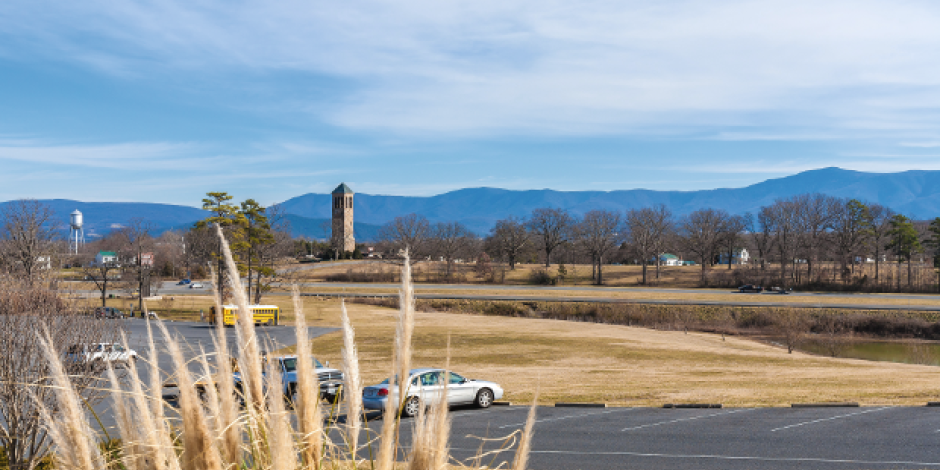We try not to talk about religion, politics, or sex,” the hairdresser says to me with a cheeky (UK)hier: verschmitztcheeky smile. I’m sitting in a beauty salon in the town of Luray, Virginia. Actually, “town” is probably an exaggeration. It’s more of a long street lined with all of the basics a community would need: a small grocery, a dinerImbiss, Esslokaldiner, a post office, and a hairdresser’s, run by Alyson Balton. “You see,” she says, “the problem is Democrats and stoutstark, entschlossen; hier: überzeugtstout Democrats, and Republicans and stout Republicans. There’s no middle groundMittelwegmiddle ground.” This is my first hintHinweishint of the deep dividetiefe Kluftdeep divide felt by people in some of these Southern states. You either love Trump or you don’t.
At the end of the salon is Brandon Davis, the town’s barberHerrenfriseurbarber. He’s reluctantzurückhaltendreluctant to speak with me at first — a suspicious attitude toward journalists that you commonly find in these parts. “I just cut hair every day. That’s all I do,” he says dismissivelyabweisenddismissively. The customer in the chair to smirkgrinsen, schmunzelnsmirks, knowing Brandon is being aloofreserviert, zurückhaltendaloof, playing dumb (N. Am., ifml.)dummdumb so that I’ll turn off my microphone and walk away.
“Ah, but you must have an opinion,” I ask with a smile. “Were you happy with the outcome of the election?”
“I think the best person in that race won. That’s for sure!” he says firmly, before turning on his electric razorRasierapparatrazor and to drown outübertönendrowning out my voice.
I’m on a 2,500-mile journey across some of the Southern states to talk to voters about how they feel Trump is performing well over a year into his termhier: Amtszeitterm. My trip started in the nation’s capital, where I picked up my rental car and waved out the window at the White House as I began to drive south to Virginia.
The town of Luray has a hidden treasure: Deep underground are some of the largest cavernHöhlecaverns in the country, so the town is used to visiting tourists. I get the sense that, when it comes to politics, people do not want to to offendbeleidigen, verletzenoffend or start a fight.
Walking down the main street, I spot a young man standing by his pickup truck. He’s wearing a hoodieKapuzenpullihoodie with an image of an AK-47 rifle printed across the front. We get chatting.
“I was afraid Hillary [Clinton] was going to take my guns, and I knew at least with Donald Trump he isn’t going to take them away,” says Chris Jessee.
“What were you afraid she’d take away?” I ask.
“Well I have an AK-47, I got an AR-15, I got sniper rifleScharfschützengewehrsniper rifles, I got pistols, silencerSchalldämpfersilencers...” He’s still talking, but I’m a bit to be taken abacküberrascht sein, verblüfft seintaken aback. What could this guy in his late twenties — around the same age as myself — possibly need all these weapons for? I interrupt him and ask just that.
“Because if it to come down to itletzten Endes, im Zweifelsfallcomes down to it, I need to be able to protect me, my family, and people around me that I care about,” he says.
This is one of Trump’s biggest appeals in rural America. People love their guns, and Trump isn’t about to take them away anytime soon. Listen to his speeches after any of the mass-shooting tragedies, and he deliberatelyganz gezielt, wohlüberlegtdeliberately and skillfully dances around the issue of gun control and the right to bear arms. He knows his people, and he knows if he cost them their guns, it would cost him any hope of reelection.
Greensboro, North Carolina
The next day, I make the four-hour drive down Interstate 81 to the city of Greensboro, North Carolina. It’s a warm evening, and the town is quiet — really quiet. The woman behind the hotel check-in desk tells me I’m the only person staying in the hotel tonight, then smiles as she to slideschiebenslides my room key over the counterTresen, Rezeptionsthekecounter to me.
After a hot shower, I walk through the town and see a woman sitting on her porchVerandaporch in a wooden rocking chairSchaukelstuhlrocking chair looking back at me. I smile and shout “Hi!” but she doesn’t respond. I take it she didn’t hear me and walk over anyway (an annoying traitCharakterzugtrait of mine, I know). Again, she’s cautiousvorsichtig, zurückhaltendcautious at first, but I’ve found, over the years as a reporter, that my greatest assetVorteilasset is being Irish. That stereotype of being a jollyfröhlich, vergnügtjolly, drunken fool really disarms people, and they open up.
We get chatting about Trump, and she doesn’t hold back. She tells me she disliked Hillary Clinton, not because of her policies, but because she was a woman.
“I just feel that it’s a man’s place to be in the office and not a woman’s. I think they can do more things,” says Karen Hinton. She tells me she didn’t like Hillary’s position on immigration, and that she was going to “let all the Hispanics stay here,” something she’d rather not see.
When I challenge her on this, she says it’s “simply how I feel.” We shake hands and I go on my way.
Gainesville, Georgia
The next morning, I wake up nice and early. The morning sun really shows off the beautiful countryside, and I drive across the state border into Georgia. I arrive in the university town of Gainesville and to grabgrabschen; hier: (sich)schnappengrab a takeaway cup of tea. I sit down on a bench in the middle of the town square. It isn’t long before someone comes over and sits beside me.
The [Obama] years were horrible for working-class people who run their own business
“I love your accent. Where are you from?” she asks. I tell her I’m from Ireland and I’m a reporter. This lady, Melanie Dabney, like many Americans I’ve met, is very confident and steadfastunerschütterlichsteadfast in her beliefs.
“I think he’s doing an awesome (ifml.)fantastischawesome job. I am really excited about the tax reforms he’s introducing and that he’s to crack downhart durchgreifencracking down on illegals,” she says of Mr. Trump. We talk some more, and I find out that her husband is an optometristOptiker(in)optometrist, and together they run a small business.
“The past eight years were horrible for working-class people who run their own business,” she says, referring to the Obama administration, “and we struggled a lot in those eight years.”
Tax reform has been on the minds of everyone in the country this year. Whether you’re a private individual or a large corporation, President Trump promised to to slashreduzierenslash your tax bill. Opponents say it’s unrealistic and a luxury the country can’t afford. Mr. Trump’s team says it will give ordinary people more money in their pockets, keep large companies on US soilBodensoil, and generally help the economy.
Melanie is delighted with the tax bill that was to passhier: verabschiedenpassed last December: “We noticed a huge difference a couple of months ago.”
She goes on to explain how she and her husband are regular “blue-collar working folk (ifml.)Arbeiterblue-collar working folk” who don’t make a lot of money, but under Trump, they’re finally seeing some rewards for their hard work. It’s a difficult case to argue with. Many people I meet on this trip seem to feel the same way. I’m sure if I spoke to an economist, he or she would point to a graph and argue that this tax cut may be helping people in the short term, but not in the long term. But Trump is clever enough to know that his voters, mainly working-class Americans, are not overly concerned about the public coffersöffentliche Kassenpublic coffers or the national GDPBIP (Bruttoinlandsprodukt)GDP. Many don’t appear even to care if Donald Trump pays his own taxes. What they’re concerned about is how many dollars they have in their pocket at the end of each month. It’s an old political maneuver, and a very effective one. People, delighted with the savings they’re making, will turn a blind eye to their politicians’ shortcomingsMängel, Defiziteshortcomings.
As we sit in the sun, I ask Melanie about some of the comments Trump has made in the past about women. “As a woman,” I ask, “how do you feel when you hear him say things like ‘Grab her by the pussy (vulg.)Muschipussy’?” She smiles. “You know what?” she says. “That didn’t even to fazestören, aus der Fassung bringenfaze me, because all men talk like that. I just think these next eight years are going to be awesome.”
It’s late in the evening, and I should be moving on. I have a long drive ahead to my next stop. But I hear a loud, friendly voice coming from a small shop in the corner of the square. I can see the beautiful flowers through the open door, and I can’t help but walk in.
Carol Slaughter is the florist. She’s a bubblyquirlig, lebendigbubbly and carefree character, and we instantly to hit it off with sb. (ifml.)sich mit jmdm. gut verstehenhit it off. But as soon as I mention I’m reporting on Trump, her whole demeanorVerhaltendemeanor changes.
“I’m sad, I’m very sad for Americans,” she says. “I’m very embarrassed because on the world stage, we’re just a joke. I really hope this isn’t broadcast in Gainesville for the sake of my business, because we’re in the Bible Belt, and it’s very Republican.”
I just think these next eight years are going to be awesome
Carol is the first person I’ve met on my journey so far who isn’t a fan of Mr. Trump. “When talking to your friends here in the town and some of your customers, can you at least understand why they voted Trump?” I ask.
“No,” she replies firmly. “I think a lot of it comes from the pulpitKanzelpulpit, don’t you think?”
It’s dark, and I’m driving on windingkurvenreichwinding roads through thick forest. The road is eerilyunheimlicheerily quiet, and as I scan the FM radio bandFunkbereichradio band, I’m bombarded with the cracklingknisterndcrackling sound of Christian music and shouting pastorPfarrer(in)pastors, telling listeners to to seek sth.sich um etw. bemühenseek salvationErlösungsalvation. I listen to a live sermonPredigtsermon on a church’s AM radio station about the dangers of Satan as I cross the state border into Mississippi.

Holly Springs, Mississippi
The next morning, I wake up in a small, sleepy Mississippi town. I head out for breakfast, and it isn’t long before I find a diner. Inside, I’m one of a few men sitting around in silence. The music plays softly in the background, interrupted by chatterGeplapperchatter from the kitchen. The door swings open, and the waitress comes through carrying plates of scrambled eggs and pancakes.
A smiling young woman pours me some tea. “What are you doing in town, sweetie?” she asks. “I’m a reporter, just passing through,” I say. “Well, welcome to Holly Springs, and if you need anything else, you just to give a holler (ifml.)Bescheid sagengive me a holler,” she says in a beautiful Southern accent. If anything, I’ve definitely experienced that famous Southern hospitalityGastfreundlichkeithospitality during this trip, something you don’t take for grantedselbstverständlichgranted when you’re so far from home.
As I sit there, looking out the window, I think about the female voters I’ve spoken to on my journey, and how they seem to justify, to gloss overschönfärbengloss over — or really just don’t care about — the way President Trump has talked about their gender in the past. It was one of the most contentiousumstritten, kontroverscontentious issues of his campaign. Today, close to two years later, it continues to fuel protests that fill the streets.
After my breakfast, I ask the owner of the diner about it outside. Samuel Cooper is a large man wearing a colorful shirt and tight suspenders (N. Am.)Hosenträgersuspenders. His explanation is simple, but accurately reflects what so many here seem to believe.
“I think he loves women, just as I love women,” he says. “It’s what God made for us, for our helpmeetGefährte, Gefährtinhelpmeet. It’s hard to do with them, and it’s hard to do without them.”
“Do you feel like Trump represents your voice and your values?” I ask.
“Yes, sir. Yes, I do,” he replies, while holding out the suspenders from his shirt.
When I ask him what the biggest issue for him is, he doesn’t to miss a beatzögernmiss a beat: “Immigration! It’s not right for us to have to take care of the illegals, while the veterans do without. There are a lot of people here who need financial help, and we’re taking care of the immigrant kids and families, and we shouldn’t have to.”
Standing by his pickup truck close by and looking over at us is Nicholas Jones, an African-American man wearing a veteran’s cap. I put the question to him: if he felt Trump was looking after the veterans. “He’s a joke! I don’t care nothing about him, and he don’t care nothing about me,” he says. When I ask him if Trump is representing his values and his views, he says: “No! He’s that ‘one percent.’ He’s a billionaire. I’m a poor man. Plus I’m a veteran — he don’t care nothing about me.”
He’s that ‘one percent.’ He’s a billionaire. I’m a poor man
Montgomery, Alabama
The final leg of my journey has brought me to the city of Montgomery, Alabama, a city to put sth. on the mapetw. bekannt machenput on the map in 1955 when Rosa Parks, an African-American, refused to give up her bus seat to a white passenger. So for a city that fought so hard to obtain civil rights, I’m curious to hear what its people think of a president who is constantly criticized for the comments he’s made about immigrant groups.
There are lovely smells coming from a hot-dog cartWagencart on the main street. In shorts, a T-shirt, and a baseball cap, Mickey Owen is the man at the grill. I ask him how his president is doing in the White House.
“I think he’s doing pretty good,” he says. “I’ve yet to see anybody who people hate as much as him. Obama, I think, everyone wanted him to do a good job, whether you voted for him or not. But I think that the tolerant left are very tolerant just as long as you agree with them.”
I spot an African-American woman walking by, shaking her head as she overhears our conversation. Her name is Maureen Williams. I swing my microphone around to her. “What do you think?” I ask.
“He’s bringing more division than anyone ever has,” she says. “He’s using bad language in the office. You can’t let your children listen to him. I mean it’s degradingentwürdigenddegrading. He’s brought this country down, and other countries are not respecting us.” I can see in her eyes that her anger toward this president is real. “I think he’s a racist. I really do,” she says.
Sundown in the South
That evening, I’m treated to a beautiful sunset over Montgomery. Sitting on a restaurant terrace, I have time to reflect on my 2,500-mile journey across the fascinating Southern United States. I’ve seen some of the most beautiful countryside and met genuinely warm and well-meaning people, hearing their stories and talking to them about Trump. In some respects, it’s been an eye-opener for me — and in others, it hasn’t.
I've met genuinely warm and well-meaning people
The reasons people vote for a person or party are complex. But it’s obvious that many in these states feel a disconnect from the urban centers of America, from the corridors of power, from where the “lefty” mass media broadcast, and where many people’s values are not represented.
They see Trump as one of their own. In their minds, I’d say, he’s a regular hardworking American, who, just like them, has flawFehler, Schwächeflaws. In my view, this is a masterful illusion; he’s nothing like them. He flies around in a private jet, his Fifth Avenue apartment in New York is famously adorneddekoriert, verziertadorned with gold, he has hundreds of millions, if not billionMilliarde(n)billions, of dollars to his name. But he has to tap into sth.sich etw. nutzbar machentapped into the psychePsyche, Seelepsyche of middle America, and to win sb./sth. overjmdn. überzeugen, jmdn./etw. für sich gewinnenwon it over. He doesn’t think like these people, but he knows how they think. As long as he does that, his political future is bright.
Neugierig auf mehr?
Dann nutzen Sie die Möglichkeit und stellen Sie sich Ihr optimales Abo ganz nach Ihren Wünschen zusammen.



